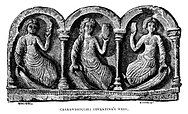You can help expand this article with text translated from the corresponding article in French. (November 2016) Click for important translation instructions.
|
| This article needs additional citations for verification. Please help improve this article by adding citations to reliable sources. Unsourced material may be challenged and removed. Find sources: "Breton mythology" – news · newspapers · books · scholar · JSTOR (November 2016) (Learn how and when to remove this message) |
| Part of a series on |
| Celtic mythologies |
|---|
 |
| Gaelic |
| Brythonic |
| Literary works |
| Motifs |
| Festivals |
| Folklore |
Breton mythology is the mythology or corpus of explanatory and heroic tales originating in Brittany. The Bretons are the descendants of insular Britons who settled in Brittany from at least the third century. While the Britons were already Christianised in this era, the migrant population maintained an ancient Celtic mythos, similar to those of Wales and Cornwall.
Breton mythology has many gods and mythical creatures specifically associated with nature cults. In this tradition of gods and creatures rooted in nature, there exist traces of certain Breton Catholic saints.
- Ankou
- Bugul Noz
- Fions
- Iannic-ann-ôd
- Jetins
- Korrigan
- Cannard Noz
- March Malaen
- Morgens
- Morvan, legendary chief of the Viscounty of Léon
- Morvarc'h
- Tadig Kozh (Placide Guillermic)
- Tréo-Fall
- Ys
See also
References
- "Legends and Romances of Brittany: Chapter VIII: Hero-Tales of Brittany". Sacred-texts.com. Retrieved 2016-11-25.
External links
| Celts and modern Celts | |||||||||||||||||||||||
|---|---|---|---|---|---|---|---|---|---|---|---|---|---|---|---|---|---|---|---|---|---|---|---|
| Celtic nations · Celtic studies · Celtic tribes · Celtic languages | |||||||||||||||||||||||
|  | ||||||||||||||||||||||
| |||||||||||||||||||||||
| |||||||||||||||||||||||
| |||||||||||||||||||||||
| |||||||||||||||||||||||
| |||||||||||||||||||||||
| |||||||||||||||||||||||
| |||||||||||||||||||||||
This Brittany-related article is a stub. You can help Misplaced Pages by expanding it. |
This article relating to a Celtic myth or legend is a stub. You can help Misplaced Pages by expanding it. |